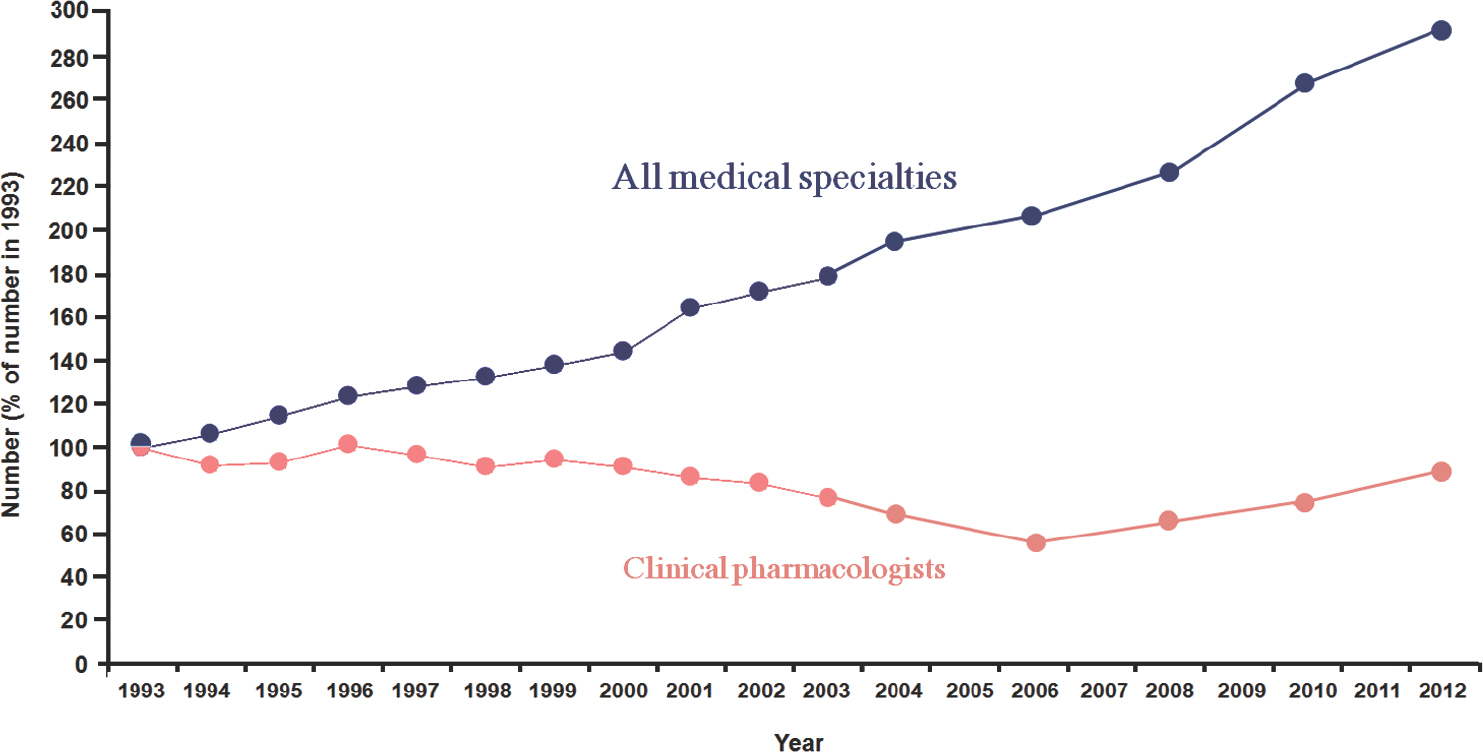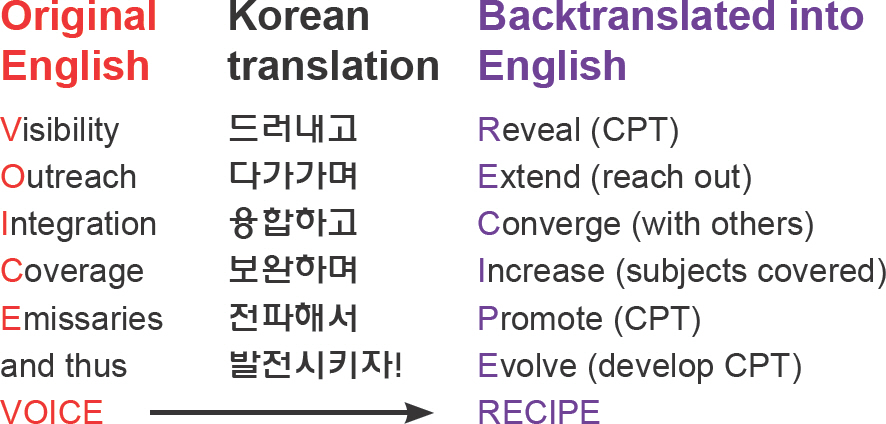Transl Clin Pharmacol.
2016 Mar;24(1):1-6. 10.12793/tcp.2016.24.1.1.
How a VOICE for clinical pharmacology turns into a RECIPE for its development
- Affiliations
-
- 1Centre for Evidence Based Medicine, Nuffield Department of Primary Care Health Sciences, University of Oxford, Woodstock Road, Oxford OX2 6GG, UK. jeffrey.aronson@phc.ox.ac.uk
- KMID: 2383593
- DOI: http://doi.org/10.12793/tcp.2016.24.1.1
Abstract
- Pharmacology is the study of the actions of synthetic or semisynthetic chemicals or naturally occurring substances on molecules, cells, tissues, and living organisms, as seen in physiological and pathological systems, seeking to establish order, pattern, and sequence among them, aiming ultimately to determine the rules by which pathophysiological information can be coded into molecules, allowing prediction of both beneficial and harmful consequences. Clinical pharmacology is the application, informed by an understanding of pharmacology, of all aspects of the study and use of medicines in humans, whose practitioners, normally medically qualified, teach, do research, frame policy, and give information and advice about the actions and proper uses of medicines in humans and implement that knowledge in clinical practice. Clinical pharmacology expanded in the UK during the 1960s and 1970s and maintained a steady state during the 1980s, but thereafter started to decline. Since 2006 this decline has been halted and partly reversed through the efforts of the British Pharmacological Society, by demonstrating the need for clinical pharmacology in clinical practice, teaching, research, and policy making, and bringing that need to the attention of medical colleagues, regulators, government, and the public. Efforts continue to maintain and enhance this recovery, using the VOICE paradigm, which involves improving and maintaining the Visibility of the specialty, Outreach to advertise its attractiveness to potential trainees and creating a public image for the specialty, Integration with other disciplines, encouraging Coverage of neglected areas, and the use of Emissaries, particularly younger members of the discipline, to promote it, both within medicine and in the wider world. Fortuitously, translation of the five elements of this paradigm into Korean, and back-translation into English, with the addition of a sixth element, provides a RECIPE for the future of clinical pharmacology and therapeutics.
Keyword
Figure
Reference
-
References
1. Lasagna L. Clinical pharmacology: present status and future development. Science. 1966; 152:388–391.
Article2. Spechtmeyer H. Klinische Pharmakologie in den USA. I. Entwicklung der klinischen Pharmakologie. [Clinical pharmacology in the USA. I. Development of clinical pharmacology.] Med Welt. 1968; 35:1833–1837.3. Uvnäs B. Klinisk farmakologi (6): utvecklingen i Sverige. [Clinical pharmacology (6): development in Sweden.]. Lakartidningen. 1970; 67:1918–1922.4. Kampffmeyer H. Impact of the West German drug law upon development of clinical pharmacology. Clin Pharmacol Ther. 1974; 16:616–619.5. Dollery CT. Report on the development of clinical pharmacology. N Z Med J. 1974; 80:222–223.6. Morgan JP. Academic clinical pharmacology: development, current and future status. J Clin Pharmacol. 1975; 15:725–730.
Article7. Naranjo CA. Farmacologia clinica en Chile: estado actual y desarrollo futuro. [Clinical pharmacology in Chile: current state and future development.]. Rev Med Chil. 1978; 106:165–169.8. Miller RR. History of clinical pharmacy and clinical pharmacology. J Clin Pharmacol. 1981; 21:195–197.
Article9. Aagaard GN (editor). Ninety years of therapeutics: a history of the American Society for Clinical Pharmacology and Therapeutics. Clin Pharmacol Ther. 1990; 47:247–304.10. Reidenberg MM. The history of Clinical Pharmacology & Therapeutics. Clin Pharmacol Ther. 1990; 47:277–9.11. Jané F. Professional prospects in clinical pharmacology. History and present situation in Spain. Methods Find Exp Clin Pharmacol. 1996; 18(Suppl C)::5–7.12. Heath G, Colburn WA. An evolution of drug development and clinical pharmacology during the 20th century. J Clin Pharmacol. 2000; 40:918–929.
Article13. Igić R. [Contribution to the history of clinical pharmacology in former Yugoslavia.] Vojnosanit Pregl. 2007; 64:573–574.14. Kshirsagar N, Kumar V. Clinical pharmacology: prospects and development in India. Indian J Pharmacol. 2011; 43:489–91.
Article15. Sjöqvist F. Development of clinical pharmacology as a medical speciality in Europe–the roles of WHO, IUPHAR and EACPT. Basic Clin Pharmacol Toxicol. 2014; 115:172–178.16. Shin S-G. History of clinical pharmacology in Korea. Transl Clin Pharmacol. 2014; 22:43–51. http://dx.doi.org/10.12793/tcp.2014.22.2.43.
Article17. Montastruc P. Histoire de la pharmacologie clinique en France: dans une scintillante introspective, l'adaptation, l'évaluation, la défense et l'illustration du médicament en France 1978–1981. [History of clinical pharmacology in France: adaptation, evaluation, defense and illustration of drug in France 1978–1981.] Thérapie. 2014; 69:481–482.18. Zagorodnikova Goryachkina K, Burbello A, Sychev D, Frolov M, Kukes V, Petrov V. Clinical pharmacology in Russia–historical development and current state. Eur J Clin Pharmacol. 2015; 71:159–163.
Article19. Gaw A. "The principles of a future pharmacology": Johann Christian Reil (1759–1813) and his role in the development of clinical pharmacology. Eur J Clin Pharmacol. 2016; 72:13–17.
Article20. Laurence D. What is pharmacology? A discussion. Trends Pharmacol Sci. 1997; 18:153–155.
Article21. Aronson JK. Medication errors: definitions and classification. Br J Clin Pharmacol. 2009; 67:599–604.
Article22. Black JW. TiPS on identity. Trends Pharmacol Sci. 1996; 17:121.
Article23. Aronson JK. A manifesto for clinical pharmacology from principles to practice. Br J Clin Pharmacol. 2010; 70:3–13.
Article24. Aronson JK. Integrating pharmacology and clinical pharmacology. Br J Clin Pharmacol. 2011; 71:787–790.
Article25. Martin JH, Henry D, Gray J, Day R, Bochner F, Ferro A, et al. Achieving the World Health Organization's vision for clinical pharmacology. Br J Clin Pharmacol. 2016; 81:223–227.
Article26. Birkett D, Br⊘sen K, Cascorbi I, Gustafsson LL, Maxwell S, Rago L, et al. Clinical pharmacology in research, teaching and health care. Considerations by IUPHAR, the International Union of Basic and Clinical Pharmacology. Basic Clin Pharmacol Toxicol. 2010; 107:531–559.27. Aronson J. When I use a word… Materia medica, clinical pharmacology, and therapeutics. QJM. 2010; 103:361–363.28. Oxford English Dictionary. http://ezproxy-prd.bodleian.ox.ac.uk. 2355/view/Entry/114933?redirectedFrom=materia+medica#eid.29. Martini P. Methodenlehre der Therapeutischen Untersuchung. Berlin: Springer Verlag;1932.30. Shelley JH, Baur MP. Paul Martini: the first clinical pharmacologist? Lancet. 1999; 353:1870–1873.
Article31. Gaddum JH. Clinical pharmacology. Proc R Soc Med. 1954; 47:195–204.
Article32. Brainerd HD, Bruyn HB, Meiklejohn G, O'Gara L. Estudios sobre la farma-cología clínica de Aureomicina. [Studies on the clinical pharmacology of aureomycin.] Pan Am Med Woman's J. 1952; 59:14–20.33. Laurence DR. Quantitative Methods in Human Pharmacology and Therapeutics. London: Pergamon Press;1959.34. Reynolds LA, Tansey EM. Clinical Pharmacology in the UK, c. 1950–2000: Influences and Institutions. Wellcome Witnesses to Twentieth Century Medicine. Volume 33:2008. London: The Wellcome Trust Centre for the History of Medicine at UCL;http://www.histmodbiomed.org/witsem/vol33.35. Anonymous. The image of clinical pharmacology. Lancet. 1970; 295:129.36. Williams G. Misleading, unscientific, and unjust: the United Kingdom's research assessment exercise. BMJ. 1998; 316:1079–1082.
Article37. Tomlinson S. The research assessment exercise and medical research. BMJ. 2000; 320:636–639.
Article38. Banatvala J, Bell P, Symonds M. The Research Assessment Exercise is bad for UK medicine. Lancet. 2005; 365:458–460.
Article39. Mroz A. First, let's find out if it will fly. Times Higher Educ. 2009 December 17. http://www.timeshighereducation.co.uk/story.asp?sectioncode=26&st. orycode=409630.40. Collini S. Impact on humanities. Times Lit Suppl. 2009 November; 13:18–19.41. Maxwell SR, Webb DJ. Clinical pharmacology–too young to die? Lancet. 2006; 367:799–800.
Article42. Pirmohamed M, Webb D, Rang H. A prescription for the NHS. Recognising the value of clinical pharmacology and therapeutics.https://www.bps.ac.uk/BPSMemberPortal/media/BPSWebsite/BPS_A_prescription_for_the_NHS_FINAL_SP. (1).pdf.43. Aronson JK. Clinical pharmacology and therapeutics in the UK–a great instauration. Br J Clin Pharmacol. 2010; 69:111–117.44. Aronson JK. Finding a VOICE for UK clinical pharmacology. Br J Clin Pharmacol. 2012; 73:843–845.
Article45. Aronson JK, Velo G. Towards a single VOICE for European clinical pharmacology: proposals for future developments. Eur J Clin Pharmacol. 2013; 69:1981–1984.
Article47. British Pharmacological Society. The Society publishes "Clinical Pharmacology: A dynamic medical speciality essential for UK Healthcare". https://www.bps.ac.uk/news-events/news/society-news/articles/the-society-publishes-clinical-pharmacology-a-dy.48. British Pharmacological Society. Clinical Pharmacology: a Dynamic Medical Speciality Essential for UK Healthcare". https://www.bps.ac.uk/BPS-MemberPortal/media/BPSWebsite/Clinical-Pharmacology-A-dynamic-medical-speciality-essential-for-UK-Healthcare.pdf.49. Welsh Government. Investing to save 3: Short-term investment for longterm benefit. 2012. http://gov.wales/docs/dpsp/publications/valuewales/12. 1107i2s3final.pdf.50. British Pharmacological Society. British Pharmacological Society Ambassadors. https://www.bps.ac.uk/my-society/get-involved/british-pharmacological-society-ambassadors.
- Full Text Links
- Actions
-
Cited
- CITED
-
- Close
- Share
- Similar articles
-
- Clinical Investigation for Voice Disorders
- The SLP's Perspectives for the Vocal Elites and Singing Voice
- A Case of Voice Therapy for Patient Who Voice Changed after Total Thyroidectomy Using Contactless Voice and Speech Therapy Service Platform
- Long-Term Management of Voice Rehabilitation Using Voice Prosthesis (Provox®) After Total Laryngectomy
- Standardization Voice Training Method for Professional Voice User Based on Traditional



